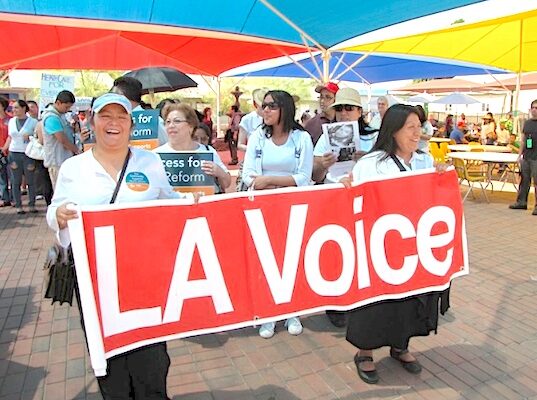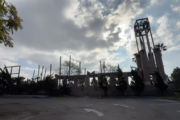For many years in the United States, churches have been at the center of progressive political and social movements. From abolitionism to child welfare and of course the Civil Rights Movement, religious groups provided the backbone for initiatives to create a fairer and more just world.
The memories of those struggles have largely faded into the background, however, and now when people imagine religion and politics intertwined, the religious right and figures like Jerry Falwell or Pat Robertson usually come to mind first. This means people are often surprised when they hear that someone can be religious, political and progressive, and that there are faith-based groups dedicated to creating progressive political change. One of these groups is in Los Angeles: LA Voice.
LA Voice is the Los Angeles member of the PICO National Network and for the last two years has stretched its mission beyond community-based organizing and moved into building electoral power and political wins that will improve its communities in a broader sense. As one LA Voice organizer noted in 2012, it doesn’t matter that a community has a new day care center “if there’s no money to fund it.”
This realization that local community power is directly tied to statewide decisions led to LA Voice’s first foray into statewide electoral politics in 2012 through the campaign for Proposition 30, an initiative that aimed to bolster education funding in California by increasing sales taxes and income tax on high earners. PICO California organizations throughout the state called voters, knocked on doors and worked thousands of volunteer hours to ensure that the proposition passed.
Bringing together congregation-based organizing and technical voter-outreach savvy, LA Voice got over 4,000 low-propensity voters (mostly of color) to the polls. With the work that LA Voice, PICO California and other community groups had done, Prop. 30 passed, and for the first time in decades Californians voted to increase their taxes.
LA Voice hopes to move voters again in 2014 and get 8,000 low-propensity voters to the polls on November 4 to help pass the Safe Neighborhoods and Schools Act, or Proposition 47. Prop 47 would take one step toward easing the burden of mass incarceration in California and creating hope and opportunities for thousands of men and women who have been convicted of non-violent felonies.
The measure would accomplish these goals by making six non-violent offenses misdemeanors (currently the district attorney can decide whether they are a felony or misdemeanor). This limitation on sentencing would shift approximately $200 million a year from prisons to education, drug rehabilitation, crime-survivor services and mental health treatment.
Over the last 20 years, as California’s population has grown by 7 million, the state has built only 1 new university but added 22 prisons to its penal system. This dramatic growth in the number of prisons has been fueled by the long-term incarceration of people convicted of low-level, non-violent crimes like drug possession. Despite the boom in prison-building, harsh sentencing for relatively minor offenses has led to the massive over-crowding of California prisons and the subsequent takeover of the California system by the federal government.
This culture of incarceration has also produced incredibly racialized outcomes, with African American men criminalized and imprisoned at rates well beyond white and Latino men, per capita. There have been a number of attempts to alleviate this problem—changing the three strikes law in 2012, releasing certain non-violent offenders, transferring them to local jails and now Prop 47.
In an off-year, midterm election without much else on the ballot to bring voters to the polls, passing the measure could prove to be challenge. To make Prop 47 a reality a broad coalition of actors has come together in Los Angeles, from Homeboy Industries (a member of LA Voice) to Community Coalition, the Catholic Archdiocese of L.A. and various labor organizations.
The goal for LA Voice is to reach 10,000 low-propensity voters and contribute to a statewide total increase of three to four percent in support for Prop 47 between now and November 4. As of this writing, LA Voice congregation-based teams have talked with 12,000 voters and confirmed 9,597 “yes on 47” votes. If these faith leaders can repeat and build on their success in 2012, perhaps it will surprise fewer people that someone can be religious, political, progressive and successful at shifting the status quo.
Rebecca Sager is a guest contributor with the USC Center for Religion and Civic Culture.






